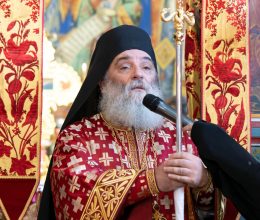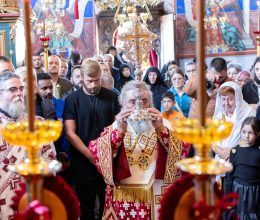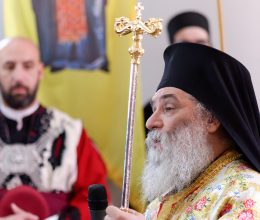Sermon by His Grace Bishop Partenij of Antania, Abbot of the Holy Bigorski Monastery, delivered at the Vespers service in honor of Saint Parthenius of Lampsacus, the Wonderworker, on February 19, 2024, Anno Domini
Your Grace, our beloved brother and co-celebrant, holy Bishop of Amorion and Abbot of the Holy Imperial, Patriarchal, and Stavropegic Monastery of Vlatadon in Thessaloniki, Mr. Nikiforos,
Venerable, most venerable, and reverend fathers,
Right reverend presbyters,
Venerable mother superiors and reverend sister nuns,
Dear students of the Monastery of Vlatadon,
Beloved guests and cherished brothers, sisters, and children,
Contemplating this sacred ecclesiastical assembly, composed of members from several Local Orthodox Churches, in honour of Saint Parthenius of Lampsacus, the Wonderworker, who is the heavenly protector of my humility, I see myself and all of us enveloped in the great embrace of the Orthodox faith and God’s revelation that connects us with the universal Church, as the body of Christ. This is what our common, irreplaceable, and unique identity is recognized by – that we are all Christ’s, and everything else fades before this belonging. Therefore, I believe that this celebration is not just a personal joy and individual commemoration, but also a deep reflection of the conciliarity of the Church, a testimony to our shared identity in Christ, Who invites us to love, to that “bond of perfection” in communion with Him and one another.[1] /p>
And precisely for this reason, I find myself lacking suitable words to adequately thank all of you for this “unspeakable and glorious joy” [2] that you bring not only to me but to the entire Orthodox community here.
I especially thank you, Holy Bishop of Amorion and through you His All-Holiness the Ecumenical Patriarch Mr. Bartholomew, who these days has already sent me a congratulation letter with best wishes and congratulations from his sensitive paternal heart, and now has confirmed it again through your esteemed personal presence. I thank you, Right Reverend Bishop, for all the prayers and efforts you contributed to our ancient and glorious Ohrid Archbishopric Justiniana Prima, to find once again unity and conciliarity in the Orthodox ecumene. Before you, we express our immense gratitude to all who selflessly invested themselves and sacrificed for the establishment of unity. We will always keep alive our memory, gratitude and appreciation for the First Throne of Orthodoxy, the Great Church of Christ, and to its holy Primate, the Ecumenical Patriarch Mr. Bartholomew, who with his higher judgment, founded in the canons and tradition, honoured the humble appeal from our Holy Synod, and was the first, being the sole authority, to justify and receive us into the embrace of the holy Orthodoxy, making us “a royal priesthood, a holy nation”.[3].

Indeed, we Orthodox must never forget the city of Constantinople, the city of our Most Holy Lady Theotokos, the city of countless Saints, where the redemptive faith was affirmed and from which Orthodoxy shone forth towards many nations and regions. That Divine Providence arranged this centre of universal Orthodoxy and that God’s grace maintains and cares for it, is confirmed by the very fact that to this day, the Mother Church, the Ecumenical Patriarchate lives there. Faced with attempts for demeaning it and taking away its glorious seats, first and foremost the magnificent Hagia Sophia, it was finally, not without God’s knowledge and providence, moved to the district known as Phanar, from where it humbly continues to shine its light to all in spirit and truth. The Mother of God has not forgotten her imperial city; the Saints have not forgotten the city of the Ecumenical Councils, but even today protect their heritage in it and call us, their children, all Orthodox, to unite around the first Throne of the faith and civilization of ours. To honour and support it, thereby gaining the blessing from the heavenly city of Saints. Unity in the faith of the Gospel and in the tradition of the Fathers is one of the aspects of conciliarity, I would say – its quality, but also a condition. Only he who gathers, who strives to bring the estranged and separated back into Christ’s flock, only he who heals wounds according to the remedies prescribed by the Fathers of the Church – he is the one who builds, renews, and unites. He performs the works of light, which simultaneously reveal the works of darkness, standing opposite. Today, trying with my modest abilities to discern the events in the world and in the Church, I wonder – has the nature of the Christian changed, losing Christ? Have we lost empathy, the need for the common collective and the individual need of every brother when in suffering? Do we use the opportunity, when someone is burdened by the yoke of temptation, to fulfil some of our desires and ideas, which are passionate, power-loving, and vanity-like? However, Lord never allow us to be without hope, but calls us to endure to the end, for ours is to “stand firm, to stand with fear, to be attentive,” and He supplements weaknesses and establishes justice.

And indeed, is not Constantinople the cornerstone of our Orthodox civilization? Is it not the cradle in which Romiosini was born and grew, that nationally incomprehensible entity, not only as a historical phenomenon, but also as a living and eternally active existence of the indestructible spirit of Orthodoxy, intertwined with human reach into the sublime and beautiful? The saga of Romiosini is not confined to the annals of history; it is a vivid, pulsating presence that echoes in the heart of every Orthodox, regardless of his current national affiliation. It embodies the synthesis of the Christian faith and the wisdom and experience of the centuries. This enduring legacy, forged in the fire of trials, challenges, and triumphs, serves as a beacon, guiding the Orthodox person through the vicissitudes of history. The essence of Romiosini transcends geographical and temporal boundaries, personifying the eternal quest for truth, beauty, and virtue. The legacy of Romiosini also stands as a monument testifying the capacity of the human spirit to endure, adapt, and thrive amidst the shifting sands of time. The wealth of this heritage, contained in Liturgy, art, philosophy, aesthetics, and communion, offers a source of wisdom and inspiration for navigating through the complexities of the modern world. It is a heritage, which calls all Orthodox to live in accordance with the values of faith, hope, and love. Thus, fostering a sense of unity and purpose that transcends individual and collective challenges, while simultaneously preserving the authenticity and distinctiveness of everyone equally and incorporating differences into a common wealth of culture and beauty. Hence, it is imperative to recognize that the true strength of the New Rome lies not in the realm of temporal power or worldly recognition but in the depth of its spiritual and cultural heritage, in holiness and blessing, and most of all, in the Cross and Resurrection testimony. For what is the highest reach in the spiritual biography, if not the humble-like suffering that surpasses all human logic and overcomes forces? It is then we truly realize how much God loves us, but at the same time how much we, persevering in the struggle, can show to Him that our heart is His throne. I will conclude this contemplation with the exclamation of today’s father of Romiosini, the Ecumenical Patriarch Mr. Bartholomew: “And you, most beloved Romiosini, carry firmly the omophorion of the Most Holy Theotokos and follow her steps to the Praetorium, to martyrdom, to the Cross, to the taking down from the Cross, and to the Tomb. So that before the new day even dawns, we could hear together with her: ‘Pure Virgin, rejoice! Thy Son hath risen from the grave on the third day,’ and you, and you, our sweet Romiosini together with Him, together with the Risen Christ!”
Considering these humble reflections, Holy Bishop of Amorion, and wishing to thank you once more for your desire to come here with the students from Your Holy Monastery, who hail from several countries across different continents, I cannot say that you come as strangers from afar, but rather as our own, coming from our common cultural homeland, from the spiritual realm of the Holy Fathers of our faith. Your testimony that you come to this Holy Monastery of the Honourable Forerunner as to your own home, and the honour and love you show us, affirm what was previously said and gladden and soothe our hearts.
I especially thank the Athonite fathers, who, besides the effort made to travel here, with their singing, soaked in prayerfulness, spirituality, and asceticism, revealed to us a world where time and eternity intertwine. Their heavenly chanting is not only an expression of serious monastic devotion but also a deep inhalation of Romiosini, an introduction to the essence of Orthodox tradition and celebration.
I thank our beloved Venerable Fathers, Mr. Matthew and Mr. Cherubim, our years-long brothers and friends, as well as the other honourable fathers from the Orthodox Church of Greece, Venerable Father Kalinik, who came to us from Imbros, Turkey, and all of you, beloved children, brothers and sisters, who with your prayers and joy, brought heaven in this sacred space.
We joyfully anticipate the arrival tomorrow of our esteemed and holy Archpastor of this god-fearing Diocese of Debar and Kichevo, His Eminence Metropolitan Mr. Timothy.
May the prayers and blessings of our Father among the Saints, Parthenius of Lampsacus the Wonderworker, be with all of you!
[1] Col. 3,14.
[2] 1. Pet. 1,8.
[3] 1. Pet. 2,9.















